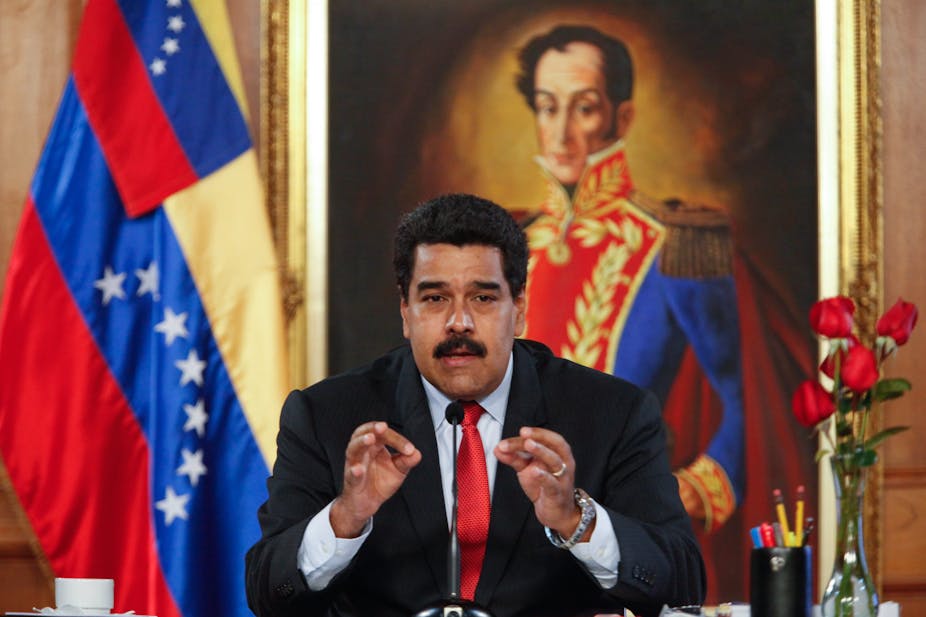Cultural imperialism is alive and well. The desire of successive governments of the United States to destabilise governments in Latin America that are too far left for Washington’s taste is well and truly embedded in American film and TV.
At least that’s the substance behind a recent tweet from Delcy Rodríguez, Venezuela’s minister of information. She accused Hollywood of producing scripts that take “imperialistic actions against legitimate governments”.
Rodríguez was complaining about a 19-second sequence in the third episode of Legends, a new serial on the mid-tier US cable TV network TNT. The episode aired on August 27. The programme stars Sean Bean as a quasi-vigilante working for the FBI. He is a descendant of Jack Bauer in 24 – someone who will do anything to keep the country safe.
In the segment in question, Bean tortures a man suspected of trading in poisonous gas. Bean sneers that “there are more nerve endings in the lower back than the genitals”, then jams a hot iron on his back. Bean’s captive reveals that he is working for “Maduro” because the “PSUV is worried about civil unrest in Venezuela”.
The rest of the episode veers away from Venezuela. But for Rodríguez, the damage was done. She complained and ordered the nation’s telecommunications regulator, CONATEL, to investigate.
Meanwhile, international relations thunder on. DC has imposed travel restrictions to punish Venezuela because 43 people have died so far this year in protests against an increasingly authoritarian regime.
Hostile tendencies
In the offending sequence from Legends, “Maduro” is of course President Nicolás Maduro, and the acronym stands for the Partido Socialista Unido de Venezuela, Hugo Chávez’s legacy. Chavismo, the leftist movement built around Chávez, is again being destabilised by the United States, it seems, in ways beyond the formal support for opposition groups.
This is only one example of numerous such slights from Hollywood. Homeland had a sequence last season in which the repugnant, drug-addicted, protagonist Nicholas Brody resides in La Torre de David (Centro Confinanzas). This is a notorious uncompleted tower block in Caracas that has been squatted in real life by violent supporters of the state/heroic anarchists (depending on your view).
And NCIS Los Angeles, The Good Wife, Saturday Night Live, and Parks and Recreation have all drawn the ire of Chavistas for representing Venezuela as an illegitimate state, as have We Bought a Zoo and Captain America 2.
The Venezuelan media, which increasingly does the state’s bidding, denounced the Legends sequence, including it in online coverage as video or screen shots complete with Spanish subtitling. Articles describe Time Warner, TNT’s owner, as accusing Maduro of wanting to buy a biological bomb.
The show’s producer, Fox 21, issued a formal apology. But this wasn’t enough for the information minister, who insisted the offending material be removed from future screenings.
It’s easy to dismiss such anxieties over dramatic representation as trivial. We can argue that by fetishising these 19 seconds, Caracas is drawing more attention than would otherwise apply to a passing moment. It’s an unpopular show, on an insignificant network.
We could also say that audiences are active, competent interpreters who ably distinguish between ideology and pleasure, between current affairs and fiction. And we might criticise the critics for being unduly affected by latter-day obsessions with things being ideologically sound or politically correct.
A history of bigotry
But without in any way endorsing Chavismo, the issue needs to be understood in the context of two long histories. The first is the Monroe Doctrine, enunciated almost two centuries ago to keep Europe out of the Americas by declaring anything that went on in the region to be the domain of the US. It has remained the policy of successive administrations since that time. And the second is Hollywood’s frequently clumsy and bigoted view of the “other” Americas.
Opposition to US cultural imperialism is not new. In 1922, Mexico embargoed film imports from Hollywood because of the popular “greaser” silent film genre that featured Mexican villains. This policy was then supported by other Latin American countries. By 1927, a desire to improve distribution in these markets meant that producers were instructed to:
Avoid picturising in an unfavourable light another country’s religion, history, institutions, prominent people, and citizenry.
A decade later, studio head Sam Goldwyn complained that “the only villain we dare show today is a white American”. This trend has continued, as the industry has been (generally) wary since that time of placing overseas revenues in jeopardy through misrepresentation.
Casual denunciations, as per the episode of Legends, which liken a democratically elected head of state to those seeking to kill thousands of innocent people is an improbable narrative, politically unwise, and fundamentally unfair. Most US viewers will have no idea who Maduro is or what he represents. The sequence amounts to an in-joke for the right wing, a way for a Hollywood often portrayed domestically as too liberal to display its nationalistic credentials. It’s pathetic and I for one am glad that the Chavistas are up in (virtual) arms. This time.

